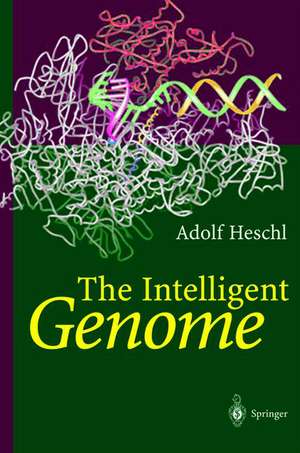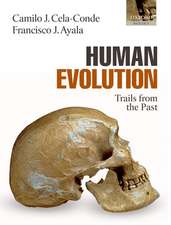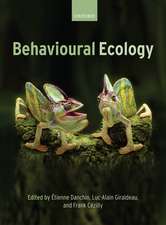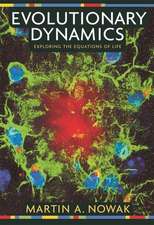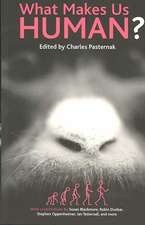The Intelligent Genome: On the Origin of the Human Mind by Mutation and Selection
Autor Adolf Heschl Desene de H. Loserlen Limba Engleză Hardback – dec 2001
Wolfgang Wieser, translated from his review in "Merkur" (Sept./Oct. 1999)
| Toate formatele și edițiile | Preț | Express |
|---|---|---|
| Paperback (1) | 648.05 lei 43-57 zile | |
| Springer Berlin, Heidelberg – dec 2010 | 648.05 lei 43-57 zile | |
| Hardback (1) | 649.87 lei 43-57 zile | |
| Springer Berlin, Heidelberg – dec 2001 | 649.87 lei 43-57 zile |
Preț: 649.87 lei
Preț vechi: 764.55 lei
-15% Nou
Puncte Express: 975
Preț estimativ în valută:
124.35€ • 130.16$ • 103.50£
124.35€ • 130.16$ • 103.50£
Carte tipărită la comandă
Livrare economică 31 martie-14 aprilie
Preluare comenzi: 021 569.72.76
Specificații
ISBN-13: 9783540671664
ISBN-10: 3540671668
Pagini: 364
Ilustrații: VII, 355 p.
Dimensiuni: 155 x 235 x 25 mm
Greutate: 0.68 kg
Ediția:2002
Editura: Springer Berlin, Heidelberg
Colecția Springer
Locul publicării:Berlin, Heidelberg, Germany
ISBN-10: 3540671668
Pagini: 364
Ilustrații: VII, 355 p.
Dimensiuni: 155 x 235 x 25 mm
Greutate: 0.68 kg
Ediția:2002
Editura: Springer Berlin, Heidelberg
Colecția Springer
Locul publicării:Berlin, Heidelberg, Germany
Public țintă
ResearchCuprins
Nature Explains Nurture.- 1 The Myth of a Wonder of Nature.- 2 Evolutionary Epistemology or the Difficulties of Getting Started.- 3 To Be or Not to Be.- 4 Chance as Necessity.- 5 The Indivisible Individual.- 6 L=C.- 7 The Central Dogma Reformulated.- 8 Learning: Appearances are Deceptive.- 9 Edelman’s Errors.- 10 On the Heritability of Jazzophilia.- 11 A Superfluous Law of Evolution.- 12 The “Wonder” of Language.- 13 Intelligent Sex: A Cognitivist View of Genetic Exchange Processes.- 14 How to Explain Consciousness.- 15 The True Nature of Scientific Revolutions.- 16 “Evolution Has Us in Its Grip”.- 17 The Survival of the Most Intelligent.- 18 The Cultural Struggle of Genes.- 19 Requiem for a Wonder of Nature.- Literature.- Acknowledgement of sources.
Recenzii
From the reviews:
"All knowledge of the individual is located in the genome, argues Heschl. With such a radicality he goes much further than many other researchers like Richard Dawkins, the advocate of the selfish gene."
Frankfurter Allgemeine, translated from issue June 17, 1998.
"We cannot exclude the possibility that Heschl is simply right."
Josef H. Reichholf, translated from "Psychologie heute" (July 1999)
"I basically agree with Heschl's theses."
Manfred Eigen, translated from a personal letter to the author (Nov. 1999)
"Written by a trained ethologist and genetic epistemologist, and translated from the 1998 German original, The Intelligent Genome highlights how little we know about the genetic determination of human behaviour. … Although a very intense text, readers of this book may be drawn from various disciplines … . A rich source of bibliography and widely drawn quotes from famous philosophers and scientists, the book can also be a good research resource and reference book for any library collection." (Harjeet Khanna, Today’s Life Science, Vol. 14 (5), 2002)
"Burying the myth of the human miracle, the author Adolf Heschl goes beyond any known theories. … In a clear-cut scientific approach, Heschl claims that intelligence, although individually shaped throughout life, already pre-exists in the genome. … The author analyses theories of scientists such as Darwin, Lamarck or Weisman, at the same time taking a highly critical look at his own point of view. Following the road of mankind, the reader is taken on both an ambitious and entertaining journey." (Science in Africa, March, 2002)
"All knowledge of the individual is located in the genome, argues Heschl. With such a radicality he goes much further than many other researchers like Richard Dawkins, the advocate of the selfish gene."
Frankfurter Allgemeine, translated from issue June 17, 1998.
"We cannot exclude the possibility that Heschl is simply right."
Josef H. Reichholf, translated from "Psychologie heute" (July 1999)
"I basically agree with Heschl's theses."
Manfred Eigen, translated from a personal letter to the author (Nov. 1999)
"Written by a trained ethologist and genetic epistemologist, and translated from the 1998 German original, The Intelligent Genome highlights how little we know about the genetic determination of human behaviour. … Although a very intense text, readers of this book may be drawn from various disciplines … . A rich source of bibliography and widely drawn quotes from famous philosophers and scientists, the book can also be a good research resource and reference book for any library collection." (Harjeet Khanna, Today’s Life Science, Vol. 14 (5), 2002)
"Burying the myth of the human miracle, the author Adolf Heschl goes beyond any known theories. … In a clear-cut scientific approach, Heschl claims that intelligence, although individually shaped throughout life, already pre-exists in the genome. … The author analyses theories of scientists such as Darwin, Lamarck or Weisman, at the same time taking a highly critical look at his own point of view. Following the road of mankind, the reader is taken on both an ambitious and entertaining journey." (Science in Africa, March, 2002)
Caracteristici
A provoking and controversial analysis of the theory of our inability to learn something really new and of the extent to which our behavior is determined by our genes
